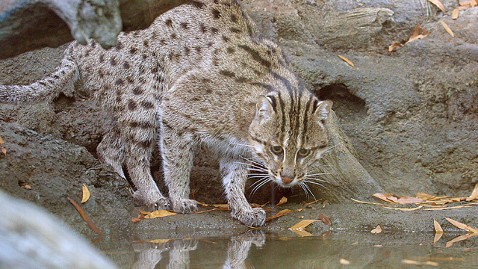Thailand's Shrimp Farms Threaten Rare 'Fishing Cats'

Credit: AFP/Getty Images
By DAN HARRIS ( @danbharris) and JAKE WHITMAN
Normally, cats avoid water like the plague, but Thailand's "fishing cats," with their partially webbed feet and pointed heads evolved for diving, are built for hunting in the mangrove swamps and streams.
But this rare breed's entire future could depend on the decisions made in, of all places, the frozen food section of the supermarket.
Biologist Namfon Cutter, who has researched these fiercely private animals for eight years, said she has only once seen one in the wild with her own eyes.
"In a way, that kind of makes it even more exciting, because you want to give them some respect," Cutter said.
Cutter and her team of researchers head out in the jungle to monitor the fishing cats through camera feeds and radio collars. When they find tracks, they set up a camera and put out a trap baited with a piece of chicken. Cutter is now tracking and studying dozens of these fishing cats through camera feeds and radio collars.
Fishing cats only live in South and Southeast Asia and there are only several thousand of them left in the wild. One of the big culprits in their potential extinction is shrimp farms.
Shrimp farmers dig big holes and raise hundreds of thousands of shrimp, which are then sorted, put on ice and shipped out.
The farms threaten fishing cats in two ways, Cutter said. The first is that the cats are losing their natural habitat to metastasizing shrimp farms, and are sometimes driven to kill chickens belonging to local villagers. Then those villagers turn around and kill the cats.
Sometimes the animals Cutter and her team have been tracking for months simply disappear, she said.
"It's very, very sad," Cutter said. "You become attached to them and then when you lose them it's very sad."
Sad, and all too common. The solution, Cutter said, may rest right here in the United States. Many of the shipments from shrimp farms are bound for Iowa, New York, California, all over the country, and one way to help save the fishing cats, Cutter said, is to not buy any packages of frozen shrimp labeled "from Thailand."
Cutter and the other fishing cat conservationists said they aren't trying to shut down the shrimp farms, but just to get them to operate more sustainably and carefully. But what would really help, she said, would be a little pressure from us.